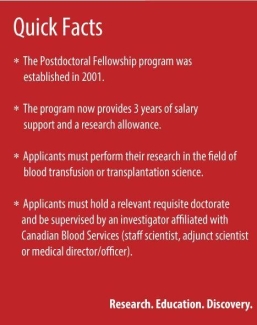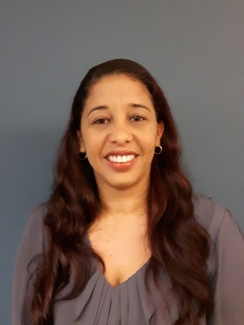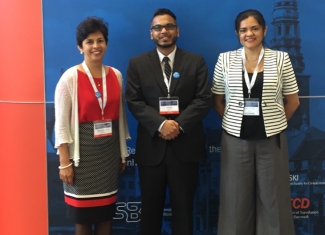Postdoctoral Fellowship Program: enhancing expertise in transfusion and transplantation science
Wednesday, November 22, 2017 Everad Tilokee
Centre for Innovation funding programs like the Postdoctoral Fellowship Program enable experts in the fields of transfusion and transplantation medicine to deepen their understanding of the blood system while making vital steps towards a safer, more effective and responsive system for Canada.

This program provides postdoctoral fellows with salary support to conduct their research and a supplementary research allowance that can be used towards purchasing materials, supplies, and other services needed to ensure a successful project. Alternatively, it enables them to attend conferences where they can exchange knowledge with peers and gain exposure to a valuable network of experts in their field.
Established in 2001, this program is one of the longest running funding opportunities offered by Canadian Blood Services. Postdoctoral fellows form a vital part of Canadian Blood Services’ esteemed research network that actively makes high-impact contributions to the research community. These advances often translate into an improved blood system and better clinical outcomes for patients.
Introducing Drs. David A. Donkor and Yoelys Cruz-Leal!
Meet Drs. David A. Donkor and Yoelys Cruz-Leal, funded recipients of the 2017–2018 Canadian Blood Services postdoctoral fellowship. We sat down with Dr. Donkor and Dr. Cruz-Leal to discuss their research and what the postdoctoral fellowship means to them.
Dr. David A. Donkor

Dr. David Donkor has been working as a Canadian Blood Services postdoctoral fellow since 2015 under the tutelage of Dr. William Sheffield. Donkor expressed that the fellowship gives him an opportunity to expand his professional network and expertise. It also allows him to bridge his interests in genetics, biotechnology, drug delivery, and a wider range of blood products saying it “felt like a natural progression from [his] PhD.”
His current work primarily focuses on two projects; the first aiming to use DNA molecules, called aptamers, to reduce the formation of dangerous blood clots that often lead to a heart attack or stroke.
“One of the advantages of using aptamers is they are non-immunogenic, giving them an advantage over protein therapeutics such as antibodies. As a result, using aptamers to inhibit the intrinsic coagulation pathway protein Factor XIa (which has been shown to be an important component in [clot] formation) is highly desirable.”
His second project tries to identify DNA aptamers that can be used as quality markers for the viability of red blood cells. This would enable blood operators to differentiate between old, defective red blood cells and healthy, viable red blood cells for safer and more effective transfusion.
“One of the benefits it provides is helping me to see the bigger picture of how I fit into the research community and beyond. It helps you understand your journey. When you are at the [lab] bench you tend to be focused on just one thing without taking a step back and looking at the overall picture of what you are doing and why.” - Dr. David Donkor
He continues on the topic of the research allowance. “I have gone [to] several conferences to see what other Canadian Blood Services scientists are working on, [to see] the impact the organization is making, and to get more ideas for my own work.”
So, what’s next for Dr. Donkor? He is hoping to increase the clot-busting potency of DNA aptamers and to observe their effect in animal models. Ultimately, Donkor envisions an encapsulated DNA aptamer that would be administered directly at the site of a blood clot where it would work to inhibit clotting factors to safely break it down.
When his lab coat is hung up for the day, Donkor enjoys playing soccer, reading and staying fit. When asked if he could keep up with Dr. Sheffield (an excellent long distance runner), Donkor quickly answered, “No way. I think I would need about 10 years to work up to his level!”
Dr. Yoelys Cruz-Leal

Originally from Cuba, Dr. Cruz-Leal is the Centre for Innovation’s newest postdoctoral fellow and is currently based at St. Michael’s Hospital in Toronto under the supervision of Dr. Alan Lazarus.
Hemolytic disease of the fetus and newborn (HDFN) occurs when a mother’s immune system sees her fetus’ blood as a foreign invader and attacks it. This can have terrible consequences for the fetus. Currently, doctors use a drug (called polyclonal anti-D) to prevent this unwanted reaction.
However, she stresses that while anti-D is effective, it is derived from human plasma which is very costly. Dr. Cruz-Leal studies how monoclonal antibody blends can trigger suppression of the immune system to decrease the chances of developing HDFN. According to Cruz-Leal, her work is the crucial first step for designing monoclonal antibodies in the lab to prevent HDFN instead of relying on plasma derived anti-D.
After an unsuccessful application in 2016, Cruz-Leal credits the competitive nature of the program as added motivation to work harder to ultimately triumph this year. Near the top of Dr. Cruz-Leal’s “To-Do list” is to publish her work, expand her project, and attend conferences such as the 35th international congress of the ISBT. Echoing Donkor’s sentiment, she emphasizes the importance of collaboration enabled by the postdoctoral fellowship program.
“I attended the annual Canadian Society of Transfusion Medicine meeting which showed me the impact that Canadian Blood Services scientists are having in this exciting field. It helped me to understand the future of our field and how I am contributing to it. The conference increased my knowledge and I hope to use my research allowance to attend similar conferences in Canada abroad in the future.” - Dr. Cruz-Leal says.
In addition to the importance of getting an outside perspective on her work, she notes the impact that this program has on her career and personal development. In the end, Dr. Cruz-Leal hopes that her fellowship work as a basic scientist gets translated into clinical use meaning less demand for plasma products and healthier patients. When she is not in the lab, Dr. Cruz-Leal can be found reading, at the movies, or as she jokes “salsa dancing like any true Cuban.”
Who can apply?
Highly qualified graduates of doctoral programs (e.g. Ph.D., M.D., D.D.S, or D.V.M.) apply for this fellowship to support their postdoctoral research, and are evaluated on the project’s relevance to Canadian Blood Services’ Centre for Innovation research priorities; their qualifications; the merit of the project (i.e. research excellence and feasibility), and the quality of the research and training environment where the work will be conducted.
The program has an international scope with a Canadian focus. Attracting applicants from Canada and abroad, this fellowship is open to applicants of all nationalities under the primary academic supervision of a Canadian Blood Services scientist/investigator, adjunct scientist or medical officer/director.
Previous projects supported by this program addressed promising alternatives to intravenous immunoglobulins, how to improve stem cell transplantation to treat cancer patients, and treatment options to control bleeding in patients with bleeding disorders like hemophilia.
Applications for the Postdoctoral Fellowship Program will be open in Summer 2018.
Subscribe to the Research & Education Round Up to stay up to date on research publications and funding opportunities.
Canadian Blood Services – Driving world-class innovation
Through discovery, development and applied research, Canadian Blood Services drives world-class innovation in blood transfusion, cellular therapy and transplantation — bringing clarity and insight to an increasingly complex healthcare future. Our dedicated research team and extended network of partners engage in exploratory and applied research to create new knowledge, inform and enhance best practices, contribute to the development of new services and technologies, and build capacity through training and collaboration.
The opinions reflected in this post are those of the author(s) and do not necessarily reflect the opinions of Canadian Blood Services.
Related blog posts
This post was written by Canadian Blood Services' postdoctoral fellows, Dr. Syed Qadri from Prof. William Sheffield's laboratory in Hamilton and Dr. Maria Loza from Dr. Sandra Ramirez‘s laboratory in Ottawa. They both crossed the Atlantic for ISBT 2017. In June 2017, more than 2000 transfusion...
Health systems impact fellow Dr. Jennie Haw digs into social aspects of cord blood banking

